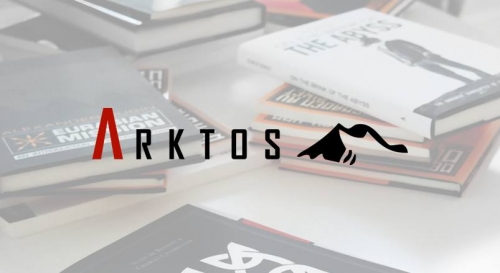
New Books at ARKTOS' Shop
Orders: https://arktos.com
Travels in Cultural Nihilism
In 2015, the magnitude of the migration crisis was such that the future of Sweden, the country that had welcomed more migrants than any other country (on a per capita basis) and that is frequently described by the UN as the ‘best country to live in in the world’, looked less than certain. Its neighbour, Norway, began preparing for its collapse. And yet, the majority of Swedes approved apparently of the changes imposed on their model society.
The essays in this book attempt to deconstruct the ideology of this liberalist multiculturalism. However, the essays’ thematic focus reaches far beyond Sweden, addressing topics as diverse as political correctness, the psycho-cultural problem of groupthink, the threat of Islamism, infringements on the freedom of speech and the flawed democracy of a federalist Europe. What ties all the essays together is an urgent need for a new kind of green conservative thinking that can more effectively challenge the discourse of globalisation, the ideology of liberalism and that can prioritise the local over the global.
There is some evidence that the tide is beginning to change. In one of the most momentous events in living history, Britain voted to leave the European Union. Political parties that wish to preserve national sovereignty have gained in support. With the referendum result, Britain can perhaps begin to look ‘over the brow of the hill’ to a more independent, outward-looking and free future. But for countries like Germany and Sweden which struggle with a liberal guilt complex, it is not yet clear whether their people will break free from the liberalist ideology, and grasp once again basic common-sense. Or whether they will become in the name of ‘multiculturalism’, the new failed States of the European Continent.
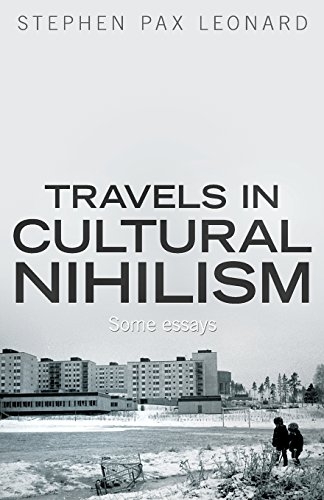
Titans are in Town
Titans are in Town consists of a novella and cultural essays by Dr. Tomislav Sunic. In the novella and his essays, Sunic discusses the state of Europeans in their postmodern wasteland. Confronted by endless interracial chaos, Europe longs for the return of Titans. Based on Friedrich Georg Jünger’s seminal 1944 work Die Titanen, the dormant Titans represent the only salvation for slumbering Europeans. The Titans’ unexpected return from mid-earth will start a resumption of Europe’s greatness.
Sunic’s protagonist Held in his novella struggles to maintain his dignity amidst a dystopian landscape in which consumerism, alien migrants and a never-ending struggle against nobility of character are unceasing. Confronted by decay all around him, he fervently hopes for the return of Europe’s Titans as foretold by the ancient Greeks. They will augur an age in which Indo-European values are restored and degeneracy forever extinguished. These final days will reassert European mythos as superior to Judeo-Christian values. Held is an Everyman for the Current Year and his struggles are reflected in the experiences of today’s Europeans.
Dr. Sunic also includes essays concerning the current degradation present within contemporary education. Intended for curious students, he discusses such topics as literature and politics along with tragedy and mythos in ancient Europe and the modern West. Titans are in Town also offers a guide on what to read in order to better understand Europe’s ancient patrimony of myths and lore. Excavating through the rubble of high culture, Dr. Sunic capably depicts pathways towards real learning for young Europeans.
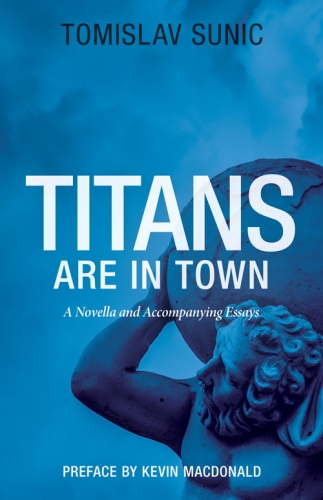
World State of Emergency
Apocalypse. In its original Greek sense, the word means “revelation.” Over the course of the next several decades, within the lifespan of a single generation, certain convergent advancements in technology will reveal something profound about human existence. Biotechnology, robotics, virtual reality, and the need to mine our Moon for energy past peak oil production, will converge in mutually reinforcing ways that shatter the fundamental framework of our societies.
It is not a question of incremental change. The technological apocalypse that we are entering is a Singularity that will bring about a qualitative transformation in our way of being. Modern socio-political systems such as universal human rights and liberal democracy are woefully inadequate for dealing with the challenges posed by these developments. The technological apocalypse represents a world state of emergency, which is my concept for a state of emergency of global scope that also demands the establishment of a world state.
An analysis of the internal incoherence of both universal human rights and liberal democracy, especially in light of the societal and geopolitical implications of these technologies, reveals that they are not proper political concepts for grounding this world state. Rather, the planetary emergency calls for worldwide socio-political unification on the basis of a deeply rooted tradition with maximal evolutionary potential. This living heritage that is to form the ethos or constitutional order of the world state is the Aryan or Indo-European tradition shared by the majority of Earth’s great nations — from Europe and the Americas, to Eurasia, Greater Iran, Hindu India, and the Buddhist East.
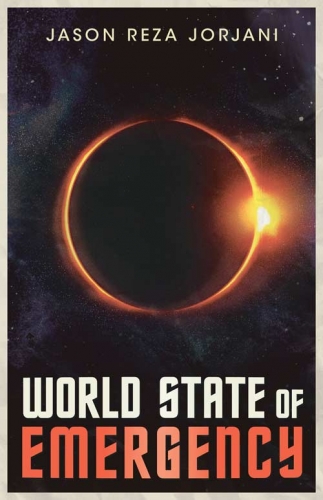
Dissident Dispatches
An Alt-Right Guide to Christian Theology
Dissident Dispatches is about Christian theology. It also gives voice to the ethno-patriotic concerns now fuelling the growth of the secular Alt-Right movement. Both reject the ongoing spiritual degeneration and concomitant demographic displacement of every white European ethno-nation.
The author, Andrew Fraser, has studied and taught history and law at leading universities in Canada, the United States, and Australia. He was born a British subject when people of British stock still counted as one of Canada’s two “founding races”. Indeed, at that time, there was no such thing as a “Canadian citizen”.
A “late loyalist” in his own personal development, Fraser deplores the ethno-masochistic eagerness with which far-too-many other WASPs still spit upon the graves of their ancestors.
He recognizes, however, that it is not enough to mourn the loss of once-secure and legitimate ethno-religious identities. Nor will politics alone save us. Dissident Dispatches outlines the fundamental elements of the Christian ethno-theology sorely needed by the Alt-Right if it is to halt, much less reverse, the rising tide of colour.
Dissident Dispatches identifies the main currents in modern Christian theology responsible for the moral and spiritual collapse of both the Anglican Church and Christendom more generally.
Given the rusted-on secularism of the Alt-Right, the book offers a critical comparative analysis of the major alternatives to a Christian ethno-theology; namely, the political theology of popular sovereignty and the cornucopian civil religion of perpetual progress.
Across a wide range of issues in systematic and practical theology, in bible studies and church history, the essays collected here provide the basic ingredients for the counter-revolutionary theology of Christian nationhood needed in contemporary debates with Christian universalists and disingenuous white liberals.
The book counters the Christophobia endemic among neo-pagan white nationalists with an intellectually respectable Christian apologetic as well as a biblical hermeneutic informed by both “kinism” (aka covenantal creationism) and “preterism” (aka covenant eschatology).
But Dissident Dispatches is more than a theological treatise. It is also a personal memoir.
The author, Andrew Fraser, is a racially aware, former law professor who became a theology student at a divinity school in suburban Sydney, Australia. He discovered there a multiracial college community of professedly Christian teachers and students promoting the postmodern cult of the “Other”. There, to be Christian is to celebrate the fact that Australia, Canada, the United States, even England, are no longer “Anglo-Saxon countries”.
Following in the author’s footsteps from one class to another, the book provides insight into the academic and personal problems likely to face pro-white students engaging in politically-incorrect speech or behaviour in a divinity school anywhere in the white, English-speaking world.
The author has considerable personal experience on the receiving end of politically correct thought policing. Early on, Dissident Dispatches explores the background to the one-year suspension meted out to the author for “offending” faculty members and/or female and ethnic students by the allegedly racist, sexist, and anti-Semitic remarks made by him in classes and seminars.
Dissident Dispatches is the unplanned product of the culture shock experienced on all sides when an Alt-Right senior citizen cum cultural warrior decides to rattle his politically-correct bars by going to a theological college run by a church often confused with the Communist Party at prayer.
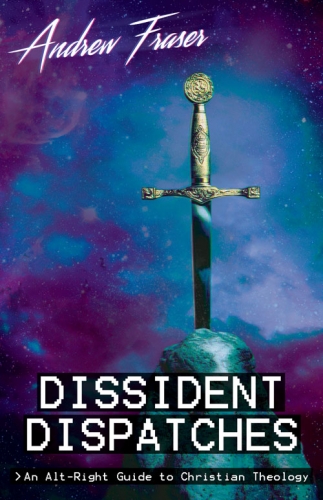
Francis Parker Yockey, herald of Western resurgence, sought to apply the philosophy of Oswald Spengler to the problems of post-1945 Europe. Yockey’s ‘Cultural Vitalism’ provides an organic and enduring method of analysis for the life-course of Civilizations.
Yockey: A Fascist Odyssey is the first sympathetic, full-length biography of this enigmatic figure. It analyses Yockey in his historical context: a post-war Europe divided between American plutocracy and Russian Bolshevism; the Europe of scaffolds, ruined cities, and Cold War confrontations.
Drawing on FBI and other state files, hitherto unpublished archives, and numerous personal interviews with those involved, this biography introduces a wealth of new material. The Allied ‘war crimes trials’ and the Communist Prague trials, both of which Yockey personally observed; opinions on Yockey by Sir Oswald Mosley, Ivor Benson, Adrien Arcand, and other important thinkers; the founding and activities of Yockey’s European Liberation Front; the genesis and impact of Yockey’s greatest writings; profiles on Yockey’s colleagues and followers; the use of psychiatry as a political weapon against dissident Rightists; the background to Yockey’s arrest, trial, and suicide — these subjects, and many more, receive unique treatment in this comprehensive biography of a political visionary.
Foreword by Tomislav Sunic.
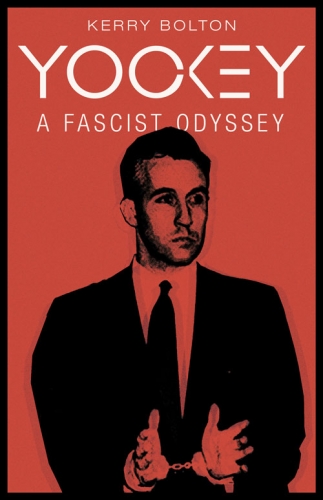




 del.icio.us
del.icio.us
 Digg
Digg
Les commentaires sont fermés.